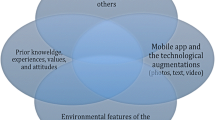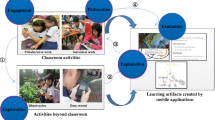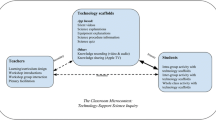Abstract
In this paper, we present a mobile technology-assisted seamless learning process design where students were facilitated to develop their personalized and diversified understanding in a primary school’s science topic of the life cycles of various living things. A goal-based approach to experiential learning model was adopted as the pedagogical design to support the student’s personalized learning process. We chose to report the student’s inquiry into the life cycles of the spinach plant and the butterfly to pinpoint the how the student’s personalized learning was fostered in the experiential learning. The learning process consisted of (a) in-class enculturation and question posing; (b) out-of-class field trip observation; (c) on site reflection after observation; (c) data collection and conceptualization of life cycles in the field trip; (d) the hands-on experimentation of growing the spinach plant and rearing a butterfly after the trip at home; (e) creation of animations and composition based on the hands-on experience individually either at home or in class to re-conceptualize the life cycles of the spinach plant and the butterfly, and (f) sharing and evaluation of their work in class. Each student was assigned a smartphone on a 1:1, 24 × 7 basis, which was used by individuals to mediate their seamless learning experience across multiple contexts. Through our analysis of the learning content, processes and products, we illuminate how the goal-based approach applied to mobile-assisted experiential learning facilitates students’ personalized learning and helps them to fulfill their agency in such learning experiences.











Similar content being viewed by others
References
Anderson, C., Domingos, P., & Weld, D. (2001). Personalizing web sites for mobile users WWW ‘01 Proceedings of International World Wide Web Conference 2001 (pp. 565–575). Hong Kong.
Aroyo, L., & Dicheva, D. (2004). The new challenges for e-learning: The educational semantic web. Educational Technology & Society, 7(4), 59–69.
Barbosa, D. N. F., & Geyer, C. F. R. (2005). Pervasive personal pedagogical agent: Mobile agent shall always be with a learner. In Proceedings of the IADIS international conference on mobile learning 2005 (pp. 281–285). Qawra, Malta.
Barton, K. & Maharg, P. (2007). E-simulations in the wild: Interdisciplinary research, design and implementation. In The society of legal scholars annual conference, Durham University, 2007-09-10–2007-09-13, Durham (Unpublished).
Bowen, K. (2011). Mixable: A mobile and connected learning environment. EDUCAUSE Quarterly Magazine, 34(1). Retrieved on February 10, 2012 from http://www.educause.edu/EDUCAUSE+Quarterly/EDUCAUSEQuarterlyMagazineVolum/MixableAMobileandConnectedLear/225849.
Cazden, C. (1986). Classroom discourse. In M. C. Wittrock (Ed.), Handbook of research on teaching (3rd ed., pp. 432–463). New York: MacMillan.
Chan, T.-W., et al. (2006). One-to-one technology-enhanced learning: An opportunity for global research collaboration. Research and Practice in Technology-Enhanced Learning, 1(1), 3–29.
Chen, C.-M., & Chung, C.-J. (2008). Personalized mobile English vocabulary learning system based on item response theory and learning memory cycle. Computers & Education, 51(2), 624–645.
Chu, H.-C., Hwang, G.-J., Tsai, C.-C., & Tseng, J. C. R. (2010). A two-tier test approach to developing location-aware mobile learning systems for natural science courses. Computers & Education, 55, 1618–1627.
Corbin, J., & Strauss, A. (2008). Basics of qualitative research: Techniques and procedures for developing grounded theory (3rd ed.). Thousand Oaks, CA, USA: Sage Publications, Inc.
de Freitas, S., & Neumann, T. (2009). The use of ‘exploratory learning’ for supporting immersive learning in virtual environments. Computers & Education, 52(52), 343–352.
Falk, J. (2004). The director’s cut: Toward an improved understanding of learning from museums. Science Education, 88(Suppl 1), S83–S96.
Huang, M.-J., Huang, H.-S., & Chen, M.-Y. (2007). Constructing a personalized e-learning system based on genetic algorithm and case-based reasoning approach. Expert Systems with Application, 33(3), 551–564.
Hwang, G.-J., Kuo, F.-R., Yin, P.-Y., & Chuang, K.-H. (2010). A heuristic algorithm for planning personalized learning paths for context-aware ubiquitous learning. Computers & Education, 54(2), 404–415.
Jacobson, M. J., So, H.-J., Teo, T., Lee, J., Pathak, S., & Lossman, H. (2010). Epistemology and learning: Impact on pedagogical practices and technology use in Singapore schools. Computers& Education, 55(4), 1694–1706.
Järvelä, S., Naykki, P., Laru, J., & Luokkanen, T. (2007). Structuring and regulating collaborative learning in higher education with wireless networks and mobile tools. Educational Technology & Society, 10(4), 71–79.
Jonassen, D. H., Howland, J., Marra, R. M., & Crismond, D. (2008). Meaningful learning with technology (3rd ed.). Upper Saddle River, N.J.: Pearson/Merrill Prentice Hall.
Jones, A., & Issroff, K. (2007). Motivation and mobile devices: Exploring the role of appropriation and coping strategies. ALT-J, 15(3), 247–258.
Kerawalla, L., O’Connor, J., Underwood, J., duBoulay, B., Holmberg, J., Luckin, R., et al. (2007). Exploring the potential of the homework system and Tablet PCs to support continuity of numeracy practices between home and primary school. Educational Media International, 44(4), 289–303.
Kolb, D. A. (1984). Experiential learning: Experience as the source of learning and development. Englewood Cliffs, NJ: Prentice Hall.
Lai, C.-H., Yang, J.-C., Chen, F.-C., Ho, C.-W., & Chan, T.-W. (2007). Affordances of mobile technologies for experiential learning: The interplay of technology and pedagogical practices. Computer Assisted Learning, 23, 326–337.
Laurillard, D. (2007) Pedagogical forms of mobile learning: Framing research questions. In Mobile learning: Towards a research agenda. Occasional papers in work-based learning (Vol. 1, pp. 153–175). London: WLE Centre, Institute of Education.
Livingstone, S. (2007). Strategies of parental regulation in the media-rich home. Computers in Human Behavior, 23(2), 920–941.
Looi, C.-K., Seow, P., Zhang, B., So, H. J., Chen, W., & Wong, L.-H. (2010). Leveraging mobile technology for sustainable seamless learning: A research agenda. British Journal of Educational Technology, 41(2), 154–169.
Looi, C.-K., Wong, L.-H., So, H.-J., Seow, P., Toh, Y., Chen, W., et al. (2009). Anatomy of a mobilized lesson: Learning my way. Computers & Education, 53(4), 1120–1132.
Looi, C.-K., Wong, L.-H., & Song, Y. (in press). Mobile computer supported collaborative learning. In: C. Hmelo-Silver, A. O’Donnell, C. Chan & C. Chinn (Eds.), The International Handbook of Collaborative Learning. New York: Routledge.
Maxwell, J. A. (2005). Qualitative research design: An interactive approach (2nd ed.). Thousand Oaks, CA: Sage Publications.
Meawad, F. E., & Stubbs, G. (2006). Towards large scale deployment of adaptive mobile learning. Proceedings of international conference on interactive mobile and computer aided learning 2006 (pp. 13–16), Amman, Jordan.
Merriam, S. B. (1998). Qualitative research and case study applications in education (2nd ed.). San Francisco, CA: Jossey-Bass Publishers.
Miettinen, R. (2000). The concept of experiential learning and John Dewey’s theory of reflective thought and action. International Journal of Lifelong Education, 19, 54–72.
O’Donoghue, J. (Ed.). (2009). Technology-supported environments for personalized learning: Methods and case studies. Hershey, PA: Information Science Reference—Imprint of IGI Publishing.
Ogata, H., & Yano, Y. (2004). Context-aware support for computer-supported ubiquitous learning. Paper presented at the 2nd IEEE international workshop on wireless and mobile technologies in education, March 23–25, 2004, JhongLi, Taiwan.
Patten, B., Arnedillo-Sanchez, I., & Tangney, B. (2006). Designing collaborative, constructionist and contextual applications for handheld devices. Computers & Education, 46(3), 294–308.
Pea, R. D., & Maldonado, H. (2006). WILD for learning: Interacting through new computing devices, anytime, anywhere. In K. Sawyer (Ed.), The Cambridge handbook of learning sciences (pp. 427–442). New York: Cambridge University Press.
Petersen, S. A., & Markiewicz, J. K. (2009). Personalized and contextualized language learning: Choose when, where and what. Research and Practice in Technology-Enhanced Learning, 4(1), 33–60.
Roschelle, J., Knudsen, J., & Hegedus, S. (2010). From new technological infrastructures to curricular activity systems: Advanced designs for teaching and Learning. In M. Jacobson & P. Reimann (Eds.), Designs for learning environments of the future (pp. 233–262). New York: Springer.
Rudd, T. (2008). Learning spaces and personalisation workshop outcomes. Bristol, UK: NESTA Futurelab. Retrieved March 16, 2012 from http://www.futurelab.org.uk/resources/documents/event_presentations/Learning_Spaces_and_Personalisation_workshop.pdf.
Schank, R. C., Fano, A., Bell, B., & Jona, M. (1994). The design of goal-based scenarios. Journal of the Learning Sciences, 3(4), 305–345.
Sharples, M., Taylor, J., & Vavoula, G. (2007). A theory of learning for the mobile age. In R. Andrews & C. Haythornthwaite (Eds.), The sage handbook of e-learning research (pp. 221–247). London: Sage Publications.
Song, Y., & Fox, R. (2008). Using PDA for undergraduate student incidental vocabulary learning. ReCALL, 20(3), 290–314.
Squire, K., & Klopfer, E. (2007). Augmented reality simulations on handheld computers. Journal of the Learning Sciences, 16(3), 371–413.
Stroup, W. M., & Petrosino, A. J. (2003). An analysis of horizontal and vertical device design for school-related teaching and learning. Education, Communication and Information, 3(3), 327–345.
Tomlinson, C. A. (2000). Reconcilable differences? Standards-based teaching and differentiation. Educational Leadership, 58(1), 6–11.
Vavoula, G., Sharples, M., Rudman, P., Meek, J., & Lonsdale, P. (2009). Myartspace: Design and evaluation of support for learning with multimedia phones between classrooms and museums. Computers & Education, 53(2), 286–299.
Wong, L.-H. (2012). A learner-centric view of mobile seamless learning. British Journal of Educational Technology, 43(1), E19–E23.
Wong, L.-H., & Looi, C.-K. (in-press). Enculturing self-directed seamless learners: Towards a facilitated seamless learning process framework mediated by mobile technology. Proceedings of IEEE international conference on wireless, mobile, and ubiquitous technology in education 2012, Takamatsu, Japan.
Wong, L.-H., & Looi, C.-K. (2009). Adaptable learning pathway generation with ant colony optimization. Journal of Educational Technology & Society, 12(3), 309–326.
Wong, L.-H., & Looi, C.-K. (2010). Swarm intelligence—new techniques for adaptive systems to provide learning support. Interactive Learning Environments. Published online: 13 July 2010. Retrieved February 10, 2012 from http://lhwong.home.nie.edu.sg/ILE-swarm_intelligence.pdf.
Wong, L.-H., & Looi, C.-K. (2011). What seams do we remove in mobile-assisted seamless learning? A critical review of the literature. Computers & Education, 57, 2364–2381.
Wong, L.-H., Song, Y., Chai, C.-S., & Zhan, Y. (2011). Analyzing students’ after-school artifact creation processes in a mobile-assisted language learning environment. Proceedings of international conference on computers in education 2011 (pp. 349–356), Chiang Mai, Thailand.
Zhang, B., Chee-Kit, L., Seow, P., Chia, G., Wong, L.-H., Chen, W., et al. (2010). Deconstructing and reconstructing: Transforming primary science learning via a mobilized curriculum. Computers & Education, 55(4), 1504–1523.
Zhao, X. Y., & Okamoto, T. (2011). Adaptive multimedia content delivery for context-aware u-Learning. International Journal of Mobile Learning and Organization, 5(1), 46–63.
Acknowledgments
This project was funded by Singapore’s National Research Foundation, Project ID: NRF2007-IDM005-MOE-008 LCK. We would like to thank Gean Chia, Peter Seow and Baohui Zhang for their contributions to the work reported here.
Author information
Authors and Affiliations
Corresponding author
Rights and permissions
About this article
Cite this article
Song, Y., Wong, LH. & Looi, CK. Fostering personalized learning in science inquiry supported by mobile technologies. Education Tech Research Dev 60, 679–701 (2012). https://doi.org/10.1007/s11423-012-9245-6
Published:
Issue Date:
DOI: https://doi.org/10.1007/s11423-012-9245-6




